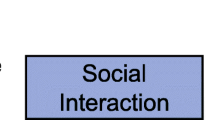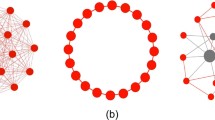Abstract
Swarm Intelligence has been a successful approach to solve some combinatorial problems through the metaphor of interacting evolving individuals of a a population P in a closed torus-like space S. Each individual usually perceives an space sorrounding it which can be generally modelled as disk of radius R. In this paper we discuss that Percolation conditions can be key to allow convergence to reach the optimal results of these kind of systems.
Access this chapter
Tax calculation will be finalised at checkout
Purchases are for personal use only
Preview
Unable to display preview. Download preview PDF.
Similar content being viewed by others
References
Bollobs, B., Riordan, O.: Percolation. Cambridge University Press, UK (2006)
Cases, B., Hernandez, C., Graña, M., D’anjou, A.: On the ability of swarms to compute the 3-coloring of graphs. In: Bullock, S., Noble, J., Watson, R., Bedau, M.A. (eds.) Artificial Life XI: Proceedings of the Eleventh International Conference on the Simulation and Synthesis of Living Systems, pp. 102–109. MIT Press, Cambridge (2008)
Deneubourg, J.L., Goss, S., Franks, N., Sendova-Franks, A., Detrain, C., Chrétien, L.: The dynamics of collective sorting robot-like ants and ant-like robots. In: Proceedings of the first international conference on simulation of adaptive behavior on From animals to animats, pp. 356–363. MIT Press, Cambridge (1990)
Dorigo, M., Blum, C.: Ant Colony Optimization theory: a survey. Theorical Computer Science 344, 243–278 (2005)
Dorigo, M., Di Caro, G.: Ant Colony Optimization: A New Meta-Heuristic. In: Angeline, P.J., Michalewicz, Z., Schoenauer, M., Yao, X., Zalzala, A. (eds.) Proceedings of Congress on Evolutionary Computation (CEC 1999), Washington DC, July 6-9. IEEE Press, Los Alamitos (1999)
Dorigo, M., Gambardella, L.M.: Ant Colonies for the Traveling Salesman Problem. BioSystems 43, 73–81 (1997)
Eberhart, R.C., Shi, Y., Kennedy, J.: Swarm Intelligence, 1st edn. Morgan Kaufmann, San Francisco (March 2001)
Grimmett, G.R.: Percolation, 2nd edn. Springer, Heidelberg (1999)
Kasteleyn, P.W., Fortuin, C.M.: Phase transitions in lattice systems with random local properties. Journal of the Physical Society of Japan 26(Suppl.), 11–14 (1969)
Mizuno, K., Nishihara, S.: Constructive generation of very hard 3-colorability instances. Discrete Applied Mathematics 156(2), 218–229 (2008)
Reynolds, C.W.: Flocks, herds, and schools: A distributed behavioral model. Computer Graphics 21 (1987)
Reynolds, C.W.: Steering Behaviors for Autonomous Characters (1999), http://www.red3d.com/cwr/papers/1999/gdc99steer.html
Author information
Authors and Affiliations
Editor information
Editors and Affiliations
Rights and permissions
Copyright information
© 2010 Springer-Verlag Berlin Heidelberg
About this paper
Cite this paper
Graña, M., Hernández, C., D’Anjou, A., Cases, B. (2010). Percolating Swarm Dynamics. In: García-Pedrajas, N., Herrera, F., Fyfe, C., Benítez, J.M., Ali, M. (eds) Trends in Applied Intelligent Systems. IEA/AIE 2010. Lecture Notes in Computer Science(), vol 6098. Springer, Berlin, Heidelberg. https://doi.org/10.1007/978-3-642-13033-5_55
Download citation
DOI: https://doi.org/10.1007/978-3-642-13033-5_55
Publisher Name: Springer, Berlin, Heidelberg
Print ISBN: 978-3-642-13032-8
Online ISBN: 978-3-642-13033-5
eBook Packages: Computer ScienceComputer Science (R0)




